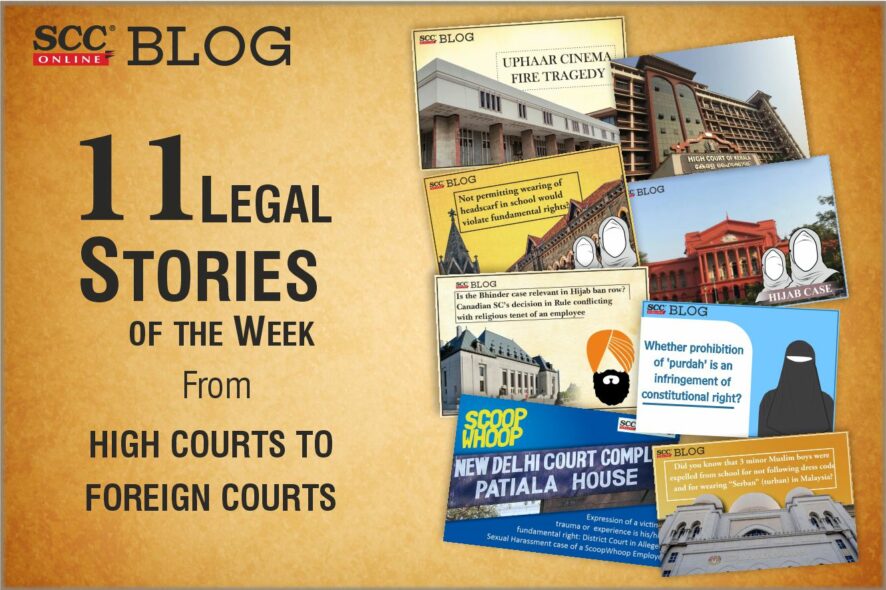Let’s have a look at the most interesting legal stories reported this week on the SCC Online Blog from High Courts, Foreign Court to District Court.
“Islam is not about turban and beard.”
— Federal Court of Putrajaya
Hijab Case | When Karnataka High Court temporarily restrained students from wearing hijab, religious flags, saffron shawls, etc.: Read Court’s interim order || A Recap
While expressing that, “Endless agitations and closure of educational institutions indefinitely are not happy things to happen”, the Bench of Ritu Raj Awasthi, CJ and Krishna S Dixit and JM Khazi, JJ., restrained all the students regardless of their religion or faith from wearing saffron shawls (Bhagwa), scarfs, hijab, religious flags or the like within the classroom, until further orders.
Read more, here.
To Wear or Not to Wear? Precedents on dilemma of wearing ‘Headscarf’ from the Kerala High Court
In Nadha Raheem v. C.B.S.E, 2015 SCC OnLine Ker 21660, Kerala High Court’s Single Judge Bench in the year 2015 dealt with petitions by two female students belonging to the Muslim community contending that the dress code prescribed by the Central Board of Secondary Education (C.B.S.E) of wearing half sleeve kurta/salvar would prejudice them, as their religious custom mandates them to wear a headscarf and also full sleeve dresses.
Read more, here.
Is the Bhinder case relevant in Hijab ban row? Canadian SC’s decision in Rule conflicting with religious tenet of an employee
In this case, a work rule was introduced, as per which all the employees had to wear a hard hat at a particular work site, but Bhinder a Sikh employee refused to comply with the said rule because his religion did not allow the wearing of headgear other than the turban.
Read more, here.
Did You Know? What Bombay High Court held when a Muslim girl raised the issue that asking her not to wear a “headscarf” in school violates her fundamental right under Article 25 of the Constitution of India?
“A girl student not wearing the head scarf or head covering studying in exclusive girls section cannot be said to in any manner acting inconsistent with the aforesaid verse 31 or violating any injunction provided in Holy Quran. It is not an obligatory overt act enjoined by Muslim religion that a girl studying in all girl section must wear head-covering. The essence of Muslim religion or Islam cannot be said to have been interfered with by directing petitioner not to wear head-scarf in the school.”
Read more, here.
Did you know that 3 minor Muslim boys were expelled from school for not following dress code and for wearing “Serban” (turban) in Malaysia?
“…in a country with many religions being practised, to allow a regulation or law to be declared unconstitutional just because someone claims that it prohibits his “religious practice” no matter how trivial it is and even though in a very limited way, would lead to chaos.”
Read more, here.
Whether prohibition of ‘purdah’ is an infringement of constitutional right? What the Supreme Court of Kuala Lumpur (Federal Court of Malaysia) decided
“…there seem to be a myth or misconception by certain groups of Muslim in Malaysia regarding the wearing of purdah which covers the entire face except the eyes. They believe that it is one of the Islamic injunctions which must be followed strictly.”
Read more, here.
Uphaar Case | Manner in which judicial records tampered revealed well-planned & methodical attempt to subvert justice system: Suspending sentence of Ansal brothers would amount eroding faith of public? Read Del HC’s decision
Stating that the manner in which Court records tampered was insidious and revealed a well-planned and methodical attempt to subvert the justice system in order to escape conviction in the Main Uphaar Case, Subramonium Prasad, J., held that since the matter relates to tampering of judicial record, the same has to be decided expeditiously in order to ensure faith of the public in the judicial system.
Read more, here.
If Court finds that marriage failed due to incompatibility, but one of the parties withholds consent for mutual separation, would that be ‘Cruelty’? Kerala HC elaborates
Expressing that, “If the conduct and character of one party causes misery and agony to the other spouse, the element of cruelty to the spouse would surface, justifying grant of divorce”, the Division bench of A. Muhamed Mustaque and Sophy Thomas, JJ., held that, Court cannot leave the life of a spouse to the mercy of the opposite spouse.
Read more, here.
Teacher administering moderate and reasonable force to enforce discipline in classroom, can be exposed to criminal prosecution? Kerala HC answers
While explaining that inflicting corporal punishment on a Child by a parent or teacher is forbidden, Dr Kauser Edappagath, J., observed that,
“Hurt of a less serious crime is not forbidden when inflicted in the reasonable chastisement of a child by a parent or by a school teacher.”
Read more, here.
If a person keeps tobacco at residence, would that amount to being an offence? Ker HC answers
While addressing a matter for an offence alleged under Cigarettes and Other Tobacco Products Act, Juvenile Justice Act and Kerala Police Act, Dr Kauser Edappagath, J., expressed that mere keeping tobacco at residence would not amount to being an offence.
Read more, here.
Expression of a victim’s trauma or experience is his/her fundamental right which can only be curtailed if it falls under 4 broad categories: Read on to know categories | Alleged sexual harassment case of a ScoopWhoop employee
Patiala House Court, while addressing the alleged case of sexual harassment against the CEO of ScoopWhoop, wherein it sought an interim injunction, Court expressed that,
Expression of a victim’s trauma or experience is his / her fundamental right which can only be curtained it is falls under four broad categories i.e. “libel, slander, defamation”, “contempt of court”, “offends against decency or morality” and “undermines the security or tends to overthrow the State”.
Read more, here.




thanks for sharing this kind of information